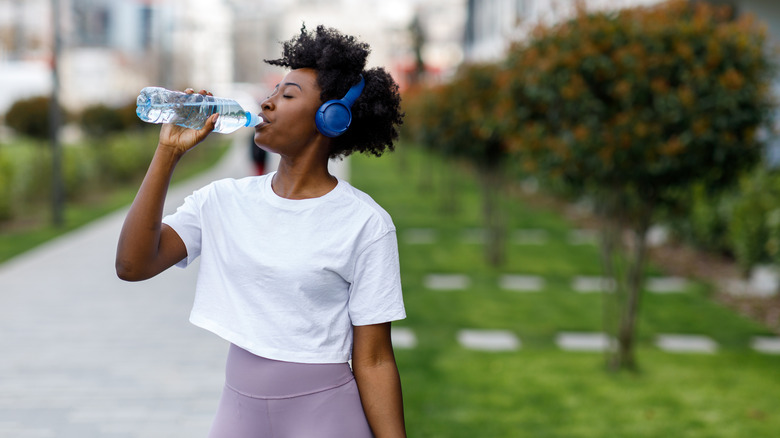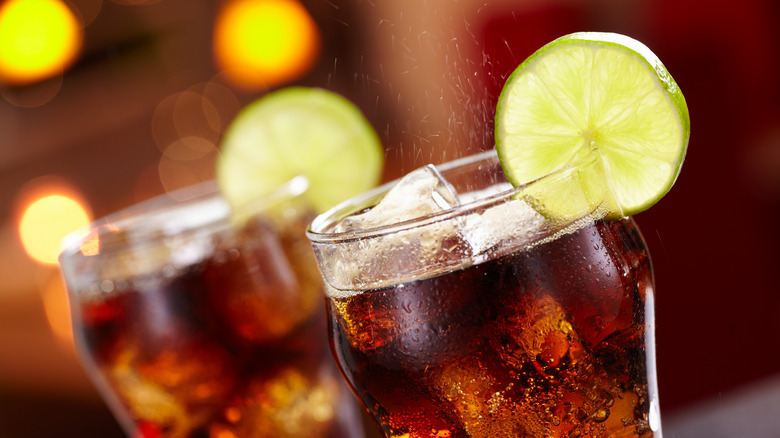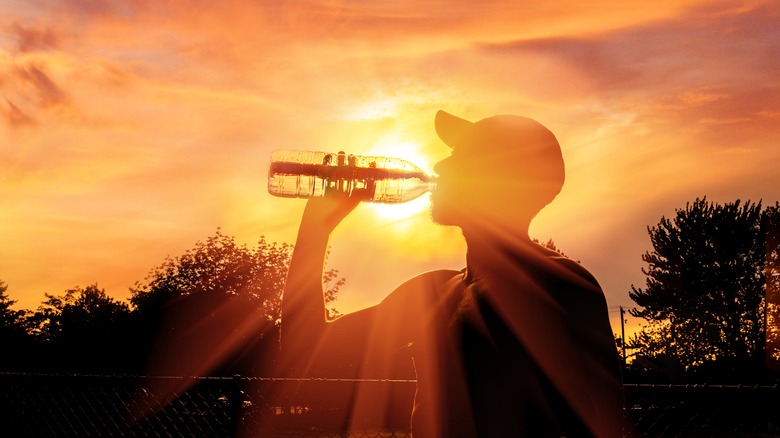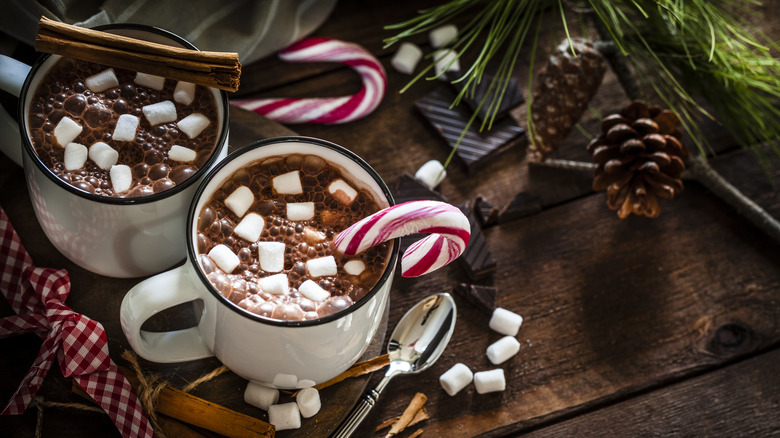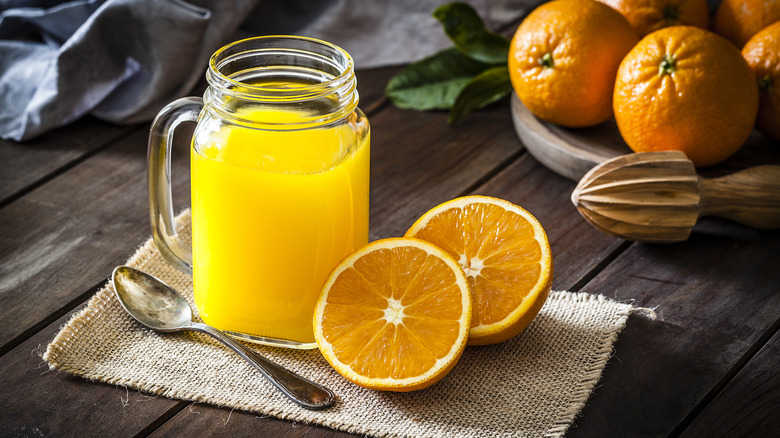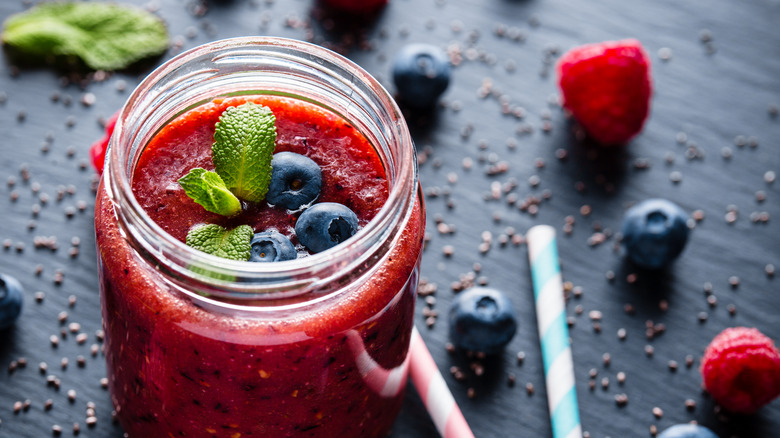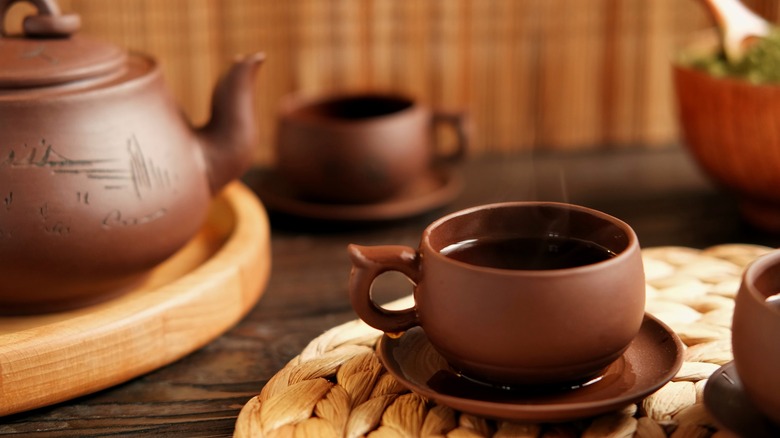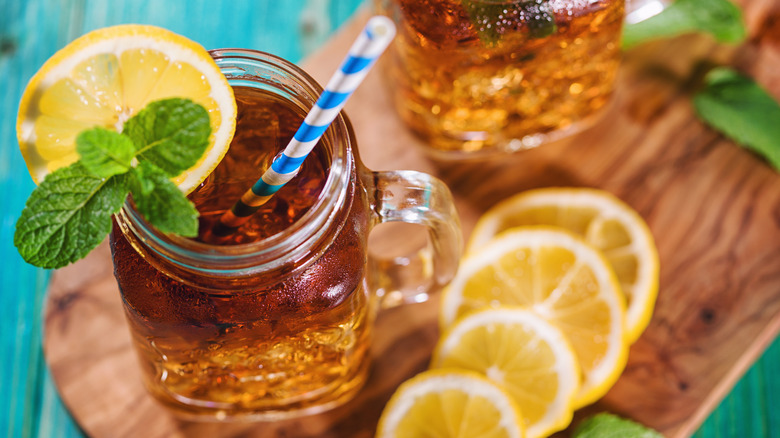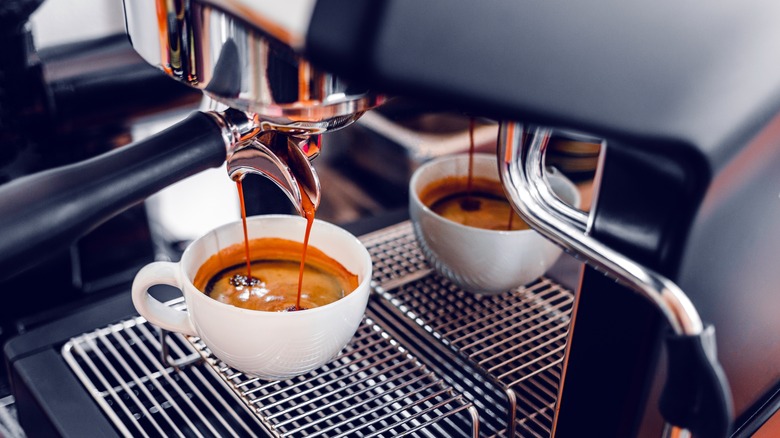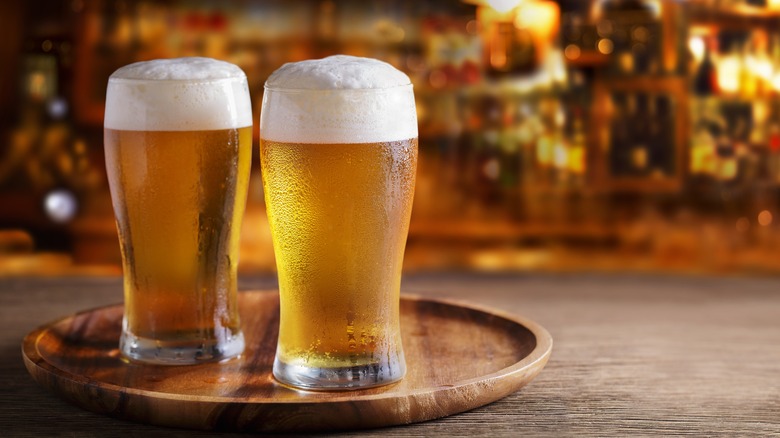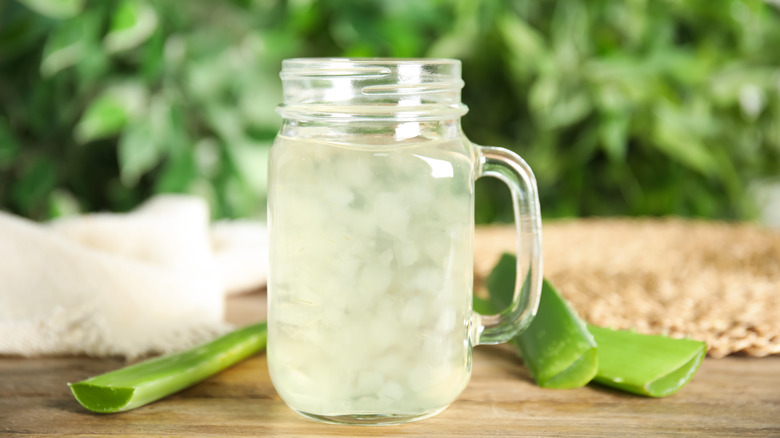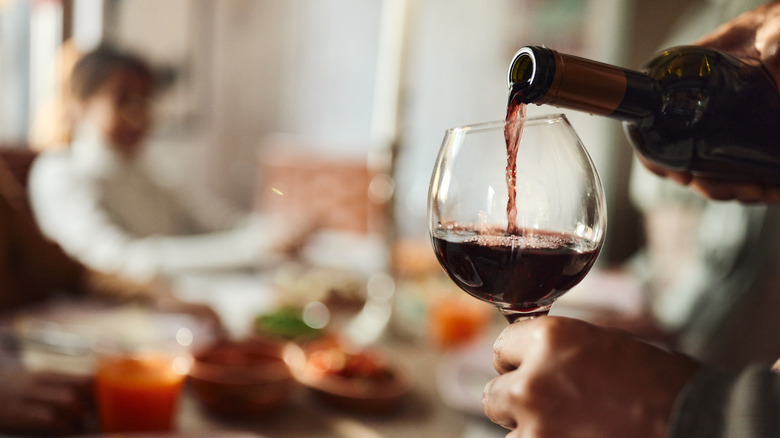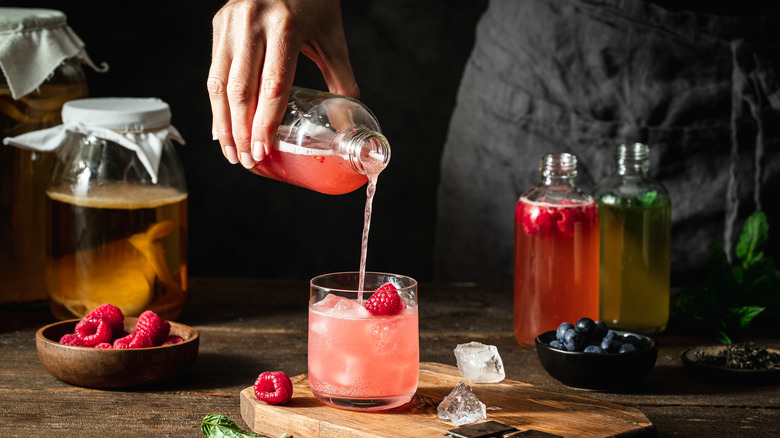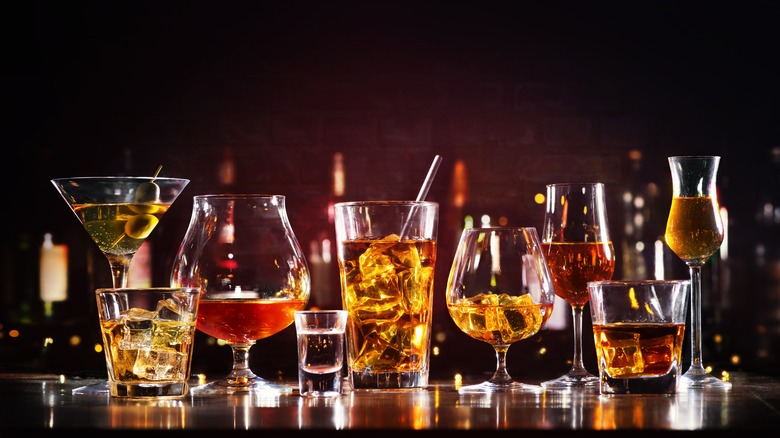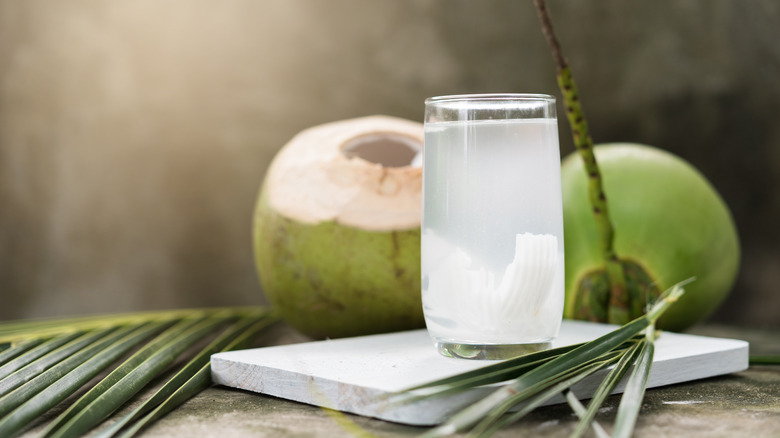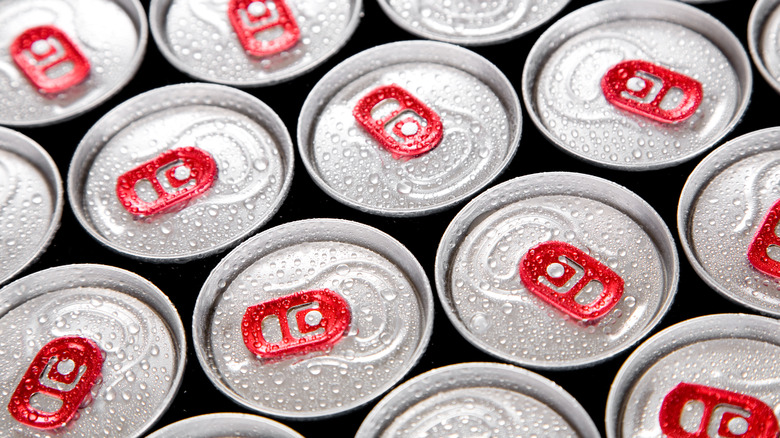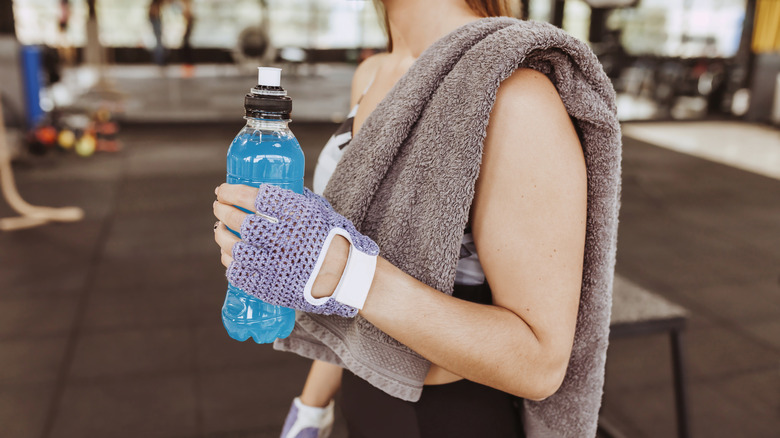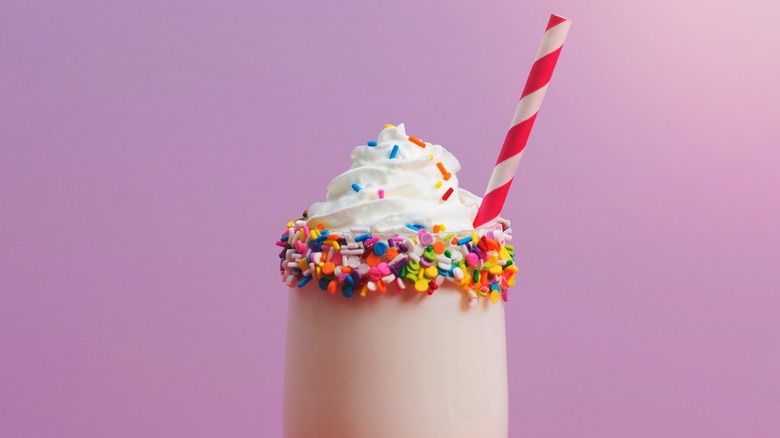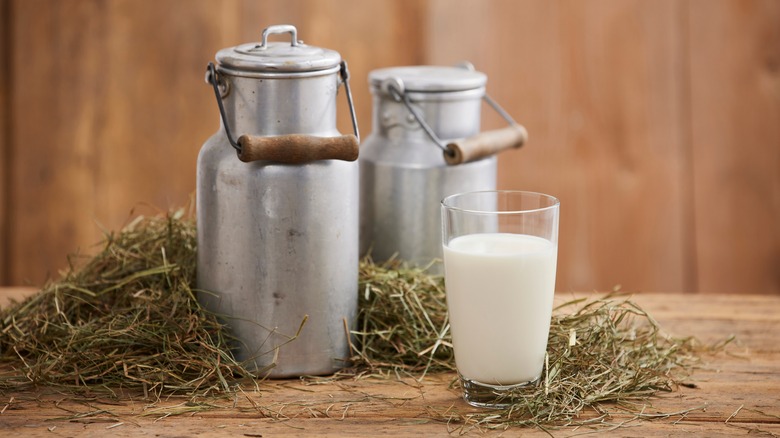18 Best And Worst Beverages For Hydration, Ranked
It's hard to understate the importance of staying hydrated, with most adults requiring a fluid intake of between 1.5 and 2 liters each day. However, these figures are more of a guide than a rule, as the exact requirements vary from person to person.
Proper hydration is essential for our overall well-being, as it allows us to regulate body temperature, lubricate joints, helps deliver nutrients to cells, moisturizes skin, prevents infections, and generally ensures our organs are functioning properly (via Harvard School of Public Health).
Conversely, dehydration can lead to severe health problems when these functions aren't working properly and can cause issues with blood pressure and heart rate. If the dehydration becomes severe, it puts you at risk of kidney and brain damage, and potentially even death. Below, we'll take a look at which beverages are the best for staying healthy and hydrated, and which ones you should avoid or only consume when your hydration needs are already met.
Worst: Soda
Despite having a relatively high water content, there are a few factors that make most sodas an unsuitable choice for staying sufficiently hydrated. The primary issue with sodas is that they tend to have a high sugar content, and often contain caffeine too.
When our blood sugar gets too high, our kidneys can't process the extra glucose quickly enough and so the excess passes into our urine, drawing more fluids along with it (per the Mayo Clinic). Ultimately, this means we need to urinate more frequently, thus becoming more dehydrated, and this is why unnaturally frequent urination can be a sign of diabetes. This is called having a diuretic effect which caffeine – another common ingredient in sodas – can cause too.
Scientists have also observed that drinking a cold, refreshing soda can manipulate us into believing we're more hydrated than we actually are, so we end up reducing our overall fluid intake and can become dehydrated more quickly (via the journal PLOS One).
Best: Water
Water is the purest and most essential hydrator, and for most of the modern world, it's cheap and accessible. It's exceedingly rare that any other beverage can match clean water for hydration, and its lack of additives (sugar or flavorings, for example) means it doesn't contain anything even moderately harmful.
While the minerality of water can vary depending on the source, and both hard and soft water can have benefits and drawbacks, none of these impact how well they hydrate you. The same goes for sparkling water — as long as the only addition is the bubbles, plain fizzy water will hydrate you just as well as still water. If you prefer sparkling water, it might even be the better choice if it means you end up drinking more of it to stay hydrated. However, it's worth noting that carbonated water can sometimes be too effective at curbing your thirst – which is not the same as hydration — and may lead to drinking too little (per Healthline).
Worst: Hot cocoa
Although the water content of hot cocoa is considerably high whether you're making it with milk or water, or a combination of the two, it's not always a good choice for staying hydrated. The fact it's a hot drink doesn't really matter, but it's because we normally dress hot cocoa up with ingredients that turn it into a poor hydrator.
Drinking chocolate usually contains sugar, as do toppings like whipped cream and marshmallows, which can have a diuretic impact that offsets the hydrating effects of the water content. Even if you choose sugar-free ingredients that use artificial sweeteners, you may be at risk of dehydration, as some sweeteners can have a laxative effect when consumed in higher amounts, which can also cause dehydration (via the National Health Service). If you are opting for hot cocoa, pick a chocolate with less sugar, and don't overdo it on the extras if you're expecting to stay hydrated.
Best: Fruit juice
Fruit juice can be an excellent way of meeting your daily fluid requirements thanks to its high water content, especially if you're after something with a little more flavor. However, it's important to remember that fruit already contains sugar, so while 100% fresh, natural juice is unlikely to contain enough to produce a noticeable diuretic effect, many packaged brands add more sugar to their recipe.
The overall effectiveness of fruit juice as a hydrator also depends on the type of fruit used, as some, such as watermelon, have a particularly high water content which also makes them less calorie-dense. Natural, additive-free fruit juice is also a great way of consuming more essential nutrients, vitamins, and antioxidants throughout the day to meet our body's requirements. And there's a benefit to having countless options to choose from, given you're mostly only limited by the type of fruit you're able to get your hands on.
Worst: Fruit smoothies
While fruit smoothies are often seen as a healthy choice of beverage and can be a great way to boost your vitamin intake or replenish your energy after exercise, their ability to keep you hydrated may be deceiving. Unlike fruit juice, smoothies contain much more of the actual fruit, which means more sugar and less water.
As we've covered, extra sugar can have a diuretic effect, and drinking a large smoothie may give you the impression you're getting more hydrated than you really are. This isn't to say you should avoid fruit smoothies — they can definitely offer nutritional benefits — just that you should be wary of portion sizes and daily intake, and that it's a good idea to drink a more effective hydrator at the same time. As with fruit juice, the type of fruit you're putting in your smoothie will affect both the water and sugar content of the beverage.
Best: Tea
After water, tea is the most widely consumed drink on the planet and has been for thousands of years – and flavor-aside, consuming a drink made from boiled water was likely an effective way of decontaminating unreliable water sources.
There are countless varieties of tea available, each of which offers its own benefits that can include increased antioxidants and properties that help with sleep, gut health, or even boost your immune system. Tea is also calorie-free and is nearly 100 percent water, so it's just as hydrating if you don't add an excessive amount of sugar. While some teas — black and green tea, for example — do contain caffeine, the levels are considered negligible when we're talking about the diuretic effect, and there are decaffeinated options available if you want to avoid caffeine altogether. It's not uncommon to feel a little thirsty after drinking tea, but this isn't due to dehydration, but rather the bitter-tasting compounds in tea called tannins that make your mouth feel dry.
Worst: Iced tea
First, it might be worth pointing out that when we're talking about iced tea, we're not just referring to regular tea that's been cooled down with ice cubes or being left in the refrigerator. If this is the case, the hydrating properties of cold tea are just the same as regular tea.
However, most iced tea recipes tend to call for a considerable amount of sugar or syrup to boost the flavor, hence its other common name, sweet tea. Then you've got the likes of bubble tea which contains tapioca pearls — also known as boba — that add an interesting chewy texture to the beverage. Unfortunately, while these teas can taste delicious, tapioca pearls are usually soaked in sugar syrup so can't really be considered healthy. As we know, that boost in sugar is also going to make you urinate more often, so they can't be considered good beverages for keeping hydrated either.
Best: Coffee
For a long time, coffee was mistakenly considered to be a poor choice of drink for staying hydrated, mostly because of the association between caffeine and the diuretic effect. However, while caffeine is certainly a diuretic, you'd have to be consuming more than the amount found in a cup of coffee for it to have a noticeable effect (via Healthline).
It's also likely that people are blaming the effects of consuming too much caffeine on dehydration as both conditions share symptoms, such as dry mouth, dizziness, and nausea. The water content in a regular cup of coffee will offset any water your body will lose as a result of the caffeine, but that's not to say it can't become an issue if your intake is high throughout the day. Plus, not every type of coffee has the same amount of water content — an Americano, for example, is going to keep you a lot more hydrated than an espresso that contains less water in general, and therefore a lower water-to-caffeine ratio.
Worst: Beer
Although beer actually has a pretty high water content, somewhere in the range of 85 to 95 percent depending on the type, most beers can't be considered a good pick for hydration, regardless of how they may taste. The problem ingredient is the alcohol which, like sugar and caffeine, has a diuretic effect.
In addition, alcohol works as a natural dehydrator by removing the water from our body's tissues, and causing our renal system — meaning our kidneys, bladder, and ureters — to remove more fluids from our blood. Ultimately, this means that regardless of beer's water content, it's going to dehydrate you more than it will rehydrate you, and the stronger the beer, the stronger this effect will be. It's always recommended to continue drinking water while you're enjoying beer to offset the effects of dehydration, something that can present itself quite acutely the following day in what we commonly refer to as a "hangover."
Best: Aloe vera juice
It's no secret that the aloe vera plant offers plenty of health benefits hidden among its iconic, spiky green leaves. While aloe vera gel is usually best used topically, when the extracts are processed into juice, it can make a highly refreshing and hydrating beverage.
Aside from having an extremely high water content that can keep you super hydrated, aloe vera juice is also packed with essential antioxidants, and nutrients, such as vitamins A, C, and E (per Healthline). However, it's recommended you avoid aloe juice if you suffer from gastrointestinal issues, such as irritable bowel syndrome. At one point, the juice was recommended as a laxative, but the research supporting its efficacy is considered outdated, so it's better to err on the side of caution to avoid stomach upset. Having said that, some aloe juice products have had the compounds that impact your gut processed out entirely, so you may not have to worry if you check the label carefully.
Worst: Wine
Although wine has a relatively high water content at around 85%, it poses the same problem as beer when it comes to hydration. The alcohol in the wine will accelerate the rate at which your body loses fluids, offsetting its water content and ultimately dehydrating you.
In fact, wine is likely worse than beer considering it generally has a higher percentage of alcohol-by-volume (ABV) per serving, so it has a lower water-to-alcohol ratio overall. Despite some wines tasting more refreshing, like a cold white over a room-temperature red, this doesn't make one more hydrating than the other. Having said that, red wine, like tea, contains tannins that are more likely to make your mouth feel dry, so it can make you feel more dehydrated than other varieties. In some ways, this isn't necessarily a bad thing if it makes you more likely to notice when it's time to replenish your fluids with a glass of water.
Best: Kombucha
Being a fermented tea, kombucha technically contains alcohol; however, unlike beer and wine, the ABV of kombucha tends to be less than 0.5 percent and can be considered "non-alcoholic." From a hydration perspective, this means the diuretic effect of the alcohol can be considered negligible, making kombucha a great way to replenish your fluids.
Kombucha has plenty of other health benefits too, including promoting a healthier gut which in turn can contribute to better absorption of water and nutrients, making it easier to stay hydrated in general. The one thing to keep an eye out for is the sugar content of kombucha — while many are sugar-free, some brands add extra sugar for flavor, while others contain residual sugars that are left over from the fermentation process. As long as you check the label and avoid kombuchas with these additives, it's an excellent drink for meeting your recommended daily fluid intake.
Worst: Spirits
As you've probably gathered by now, any alcoholic drink is going to cause dehydration to some extent. Spirits are arguably the worst considering they have the highest ABV, and the serving sizes are too small for the water content to contribute to hydration.
It also doesn't help that one of the most common ways of drinking spirits is with sugary mixers like sodas or tonic water, which compounds the dehydrating effects and will likely leave you with a worse hangover too. Like beer and wine, the best way to avoid dehydration is to regularly drink water at the same time. You can also opt for a sugar-free mixer such as plain soda water that will help, but not fully, offset dehydration. Ultimately, if a beverage is considered alcoholic in any way, you can safely assume that it's not going to be effective at keeping you sufficiently hydrated — and, as always, moderation is key.
Best: Coconut Water
Sometimes referred to as "nature's sports drink," coconut water is a fantastic choice for keeping hydrated. Extracted from young, green coconuts — and not to be confused with coconut milk which is made from the pulpy flesh — coconut water has a high water content, and it's lower in both sugar and calories.
Although it's technically no more hydrating than water, what sets coconut water apart is that it's naturally packed with tons of electrolytes, like potassium, sodium, manganese, and phosphorus, which all help maintain proper fluid balance in our bodies (via Cedars Sinai). Despite being low in sugar, it has a delicious natural sweet, nutty flavor that can make it more interesting than regular water. However, unless you have access to fresh coconuts, you'll be limited to store brands. This doesn't mean you should avoid store-bought coconut water, just that it's best to check the label before you buy, as some brands add extra sugar to boost the flavor.
Worst: Energy drinks
While energy drinks are more than capable of providing a much-needed energy boost at times, they're not effective hydrators. In fact, the vast majority of energy drinks can be considered actively unhealthy.
Although more "natural" energy drinks are becoming common, most varieties are packed with caffeine, sugar, high fructose corn syrup, or artificial sweeteners — sometimes a combination of them all. We've already covered the link between high amounts of sugar and dehydration, and while the caffeine content in coffee and tea can be considered negligible in regards to the diuretic effect, the same can't be said for a lot of energy drinks. Although some brands may be on par with a cup of coffee, there are others that can have two or three times as much caffeine. Not only will these dehydrate you more, but you're also much more likely to experience the negative effects of the caffeine.
Best: Sports drinks
Sports drinks are often marketed as being superior to regular water, and while they can offer extra benefits, it's not always the case. The main difference is that sports drinks contain added electrolytes, like those naturally occurring in coconut water, that help direct water and nutrients to where they're needed within our body.
However, not all sports drinks are the same, and many of them contain at least some sugar to make them more palatable — without it, they tend to taste a bit salty. Most sports drinks don't contain too much sugar and it's not a big problem if you're using them to hydrate and boost your energy during or after exercise. Having said that, it's not a great idea to completely replace regular water with sports drinks, regardless of how sweet they are, as it's also possible to consume too many electrolytes, leading to nausea, cramping, and dizziness.
Worst: Milkshakes
Creamy, decadent, and dessert-like milkshakes are unfortunately a less-than-ideal choice for staying sufficiently hydrated. However, it isn't actually the milk content that makes them a poor pick.
Although milkshake recipes can vary massively, at the very least they'll contain sugar syrup or flavorings that will increase your blood sugar levels and cause you to lose fluids. Many milkshakes are even more indulgent, often containing ingredients like ice cream, whipped cream, and sweet sauces, along with any number of candy-like toppings. Not only are they extra sugary and calorie-dense, but they usually have a comparatively low water content.
Additionally, a heavy milkshake is more likely to make you feel full and less likely to want a hydrating beverage to wash it down with. Ultimately, it's best to treat milkshakes as a dessert rather than a beverage, as they won't contribute to your hydration levels.
Best: Milk
In a surprising twist, it turns out that water might not actually be the ultimate beverage for hydration. Milk — both whole and skimmed — is better than water when it comes to sustaining the long-term balance of fluids in our bodies.
The reasoning behind this is that aside from having high water content, milk contains essential nutrients like fat and lactose, and electrolytes like sodium and calcium, which help with fluid retention. This effectively means that, unlike diuretics, they help water stay within our bodies, thus keeping us hydrated for longer periods of time. While research shows that milk is technically a more hydrating beverage than water, it's worth mentioning that you can't just replace water with milk on a day-to-day basis. Water should always form part of a balanced fluid "diet," as it's the only drink that will solely hydrate you without surpassing recommended nutrient intake levels, which can lead to health complications.

